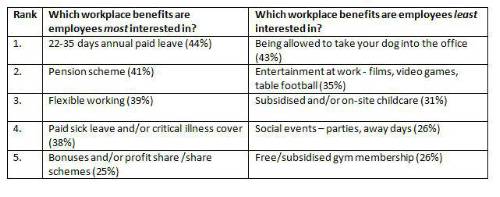By Dale Critchley, Policy Manager, Aviva
Wellbeing benefits such as flexible working and access to exercise classes are becoming much more mainstream. But while these trendier benefits sound great and make a good headline, the question always remains about whether they offer what employees and employers actually want, and whether there’s still a place for “old fashioned” benefits like a workplace pension and life cover.
Aviva recently carried out some research* into this and found that the most desirable workplace benefits are the most traditional. News that will be welcomed by actuaries I’m sure.
Employees were asked which benefits they valued and which they weren’t interested in. While the clear priority was pay, of the other benefits available 44% included annual leave among the benefits they valued, closely followed by provision for what will be their longest holiday, retirement.
The top five benefits that people value, and those they are least interested in are shown below.

When employers are looking at which workplace benefits to offer, they will often want to measure their return on investment (ROI). This can sometimes be difficult, benefit spend doesn’t always generate robust, factual data on which to base an ROI measure.
A workplace benefits package is designed to attract and retain the best people. It can do that by providing employees a sense of security, a share in success and belonging, which engenders loyalty between employer and employees. But that halo effect isn’t always tangible.
If you look at the benefits employees said they were least interested in, they’re largely low-cost. It shouldn’t cost much to allow dogs into the office, and you only buy a table football set once. The low cost and potential to appear ‘up with the times’ might make these benefits attractive to employers keen to look like the cool kids in the tech firms, but Aviva’s survey shows they aren’t widely valued.
Annual leave, pensions and sick pay have ongoing costs for employers. However, as our survey showed, employees tend to value those traditional benefits. Unlike some other benefits, it’s money invested, not just spent.
The learnings are pretty clear. Employers looking to retain and attract talented people should concentrate on their core workplace benefits first. Employees are much more likely to look at holiday, pension and sick pay before Christmas parties, table football and whether they can bring Fido into the office.
*2,011 UK employees and 502 managers and above with recruitment responsibilities surveyed by Censuswide in March 2019 on behalf of Aviva
|


